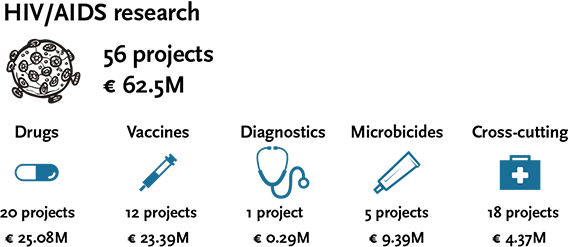World AIDS day 2015: EDCTP’s past and future investments
In its first programme, ending in December 2015, the European & Developing Countries Clinical Trials Partnership (EDCTP) has contributed to the fight against HIV/AIDS by funding clinical research involving a broad spectrum of interventions, paying special attention to vulnerable and high-risk population groups. Now in its second programme, EDCTP will build on the results of the first programme to pursue the world’s common goal of getting to zero.
HIV/AIDS research in the first EDCTP programme
The HIV/AIDS funding strategy under the first EDCTP programme focused on the key prevention and treatment issues and challenges of research in sub-Saharan Africa. The EDCTP projects also contributed to substantial capacity upgrades at research centres used for clinical trials and training of African researchers.
From its inception in 2003 until the end of the first programme in 2015, EDCTP has invested € 62.5 million to support 56 research projects on HIV/AIDS. The EDCTP portfolio on HIV/AIDS includes 20 treatment trials, second-line therapy and paediatric treatment and studies on HIV/TB co-infection. Six studies focus on the prevention of mother-to-child transmission of HIV. Eight vaccine trials, three trials on microbicides and one trial focused on mechanisms to maximise retention and adherence to treatment, have been supported.

Supported research in HIV/AIDS: achievements
Research on treatment of HIV/AIDS included the CHAPAS-1 trial in Zambia that contributed to the development of a paediatric antiretroviral formulation in fixed-dose combination which subsequently was introduced in several African countries.
The results of the EDCTP-funded CHAPAS-3 trial provided strong evidence to support the WHO guidelines for first-line paediatric antiretroviral treatment (ART). CHAPAS-3 was the first randomised controlled trial in African children to compare three ‘backbones’ for ART regimens. All regimens were shown to have low toxicity and good clinical, immunological, and virological responses. The trial allays concerns of reduced efficacy raised by observational studies. The results, published in The Lancet Infectious Diseases on 6 October 2015, support clinicians and policy makers in implementing the current WHO guidelines for ART in children.
Among the studies on the prevention of mother-to-child transmission of HIV/AIDS is the co-funded Kesho Bora study, which strongly influenced the revision of WHO guidelines on prevention of mother-to-child transmission of HIV and infant feeding.
More recently, a randomised controlled clinical trial, conducted in Burkina Faso, South Africa, Uganda and Zambia, showed that two liquid formulas of HIV drugs are safe and highly effective at protecting infants from infection while they are breastfed by their HIV-positive mothers, including in the 6-12 month period after birth which has not been studied in previous research. The results of the PROMISE-PEP/ANRS12174 study were published in The Lancet on 18 November 2015.
Under its first programme, EDCTP launched in 2006 a joint call with the Bill & Melinda Gates Foundation which resulted in six projects. The studies prepared for clinical trials of candidate HIV vaccines in sub-Saharan Africa. Among these is the SASHA project which studied the feasibility of adolescent HIV vaccine trials in South Africa and concurrently built the capacity for such trials. The project developed an ethical-legal guide for conducting clinical trials with adolescents.
EDCTP2: funding and research priorities
The calls for research proposals under EDCTP2 are broader and open to HIV/AIDS research as well as the other poverty-related and neglected infectious diseases within the programme’s scope. Since the start of the second programme in December 2014, EDCTP has launched calls for proposals worth approximately € 78.7 million in research against poverty-related and neglected infectious diseases.
EDCTP’s research priorities for 2016, among other areas, will include calls for proposals focussing on vaccines for poverty-related diseases, and clinical trials and operational studies to optimise the use of products for poverty-related diseases in mothers, new-borns, children and adolescents. More details about these calls for proposals and other activities will be published in 2016, when the EDCTP workplan for 2016 is approved.
